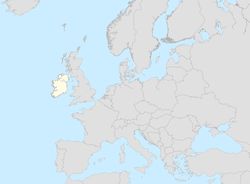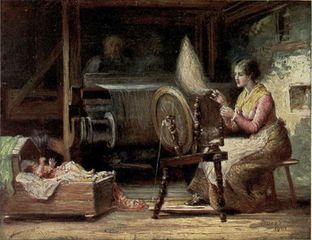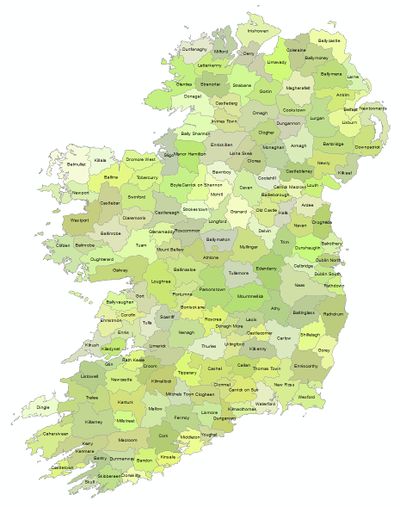Ireland Civil Registration
| Ireland Wiki Topics | |
| Beginning Research | |
| Historic Ireland (pre-1922) and Republic of Ireland Wiki Topics | |
| Record Types | |
| Northern Ireland (post-1922) Wiki Topics | |
| Record Types | |
| General Wiki Topics | |
| Ireland Cultural Groups | |
| Ireland Background | |
| Ireland Research Resources | |
Online Resources[edit | edit source]
- 1989-2020 Scotland and Northern Ireland, Death Index, 1989-2020 at Ancestry - index ($)
Introduction[edit | edit source]
Before civil registration, Church Records were kept on the island of Ireland to keep track of baptisms, marriages and burials. Protestant records often stretch back to the 18th century, while most Catholic records begin around the time of emancipation in 1829. Ireland was then part of the United Kingdom, where civil registration had been introduced in England in 1837. In 1845 this was begun in Ireland for non-Catholic marriages only, before being extended to births, deaths and marriages for people of all religions in 1864. A unified system of civil registration then operated until the partition of Ireland, after which Northern Ireland and the Republic of Ireland kept their own records with different formats and information.
A key distinction exists when searching these records between the indexes and the originals. The indexes only have very basic information such as name and year, and reference numbers to locate the originals. The indexes are widely available for free, but the originals have only recently become more accessible.
| Record Type | Start Date | Record Content |
| Births | 1864 | Child’s name; sex; birth date; birthplace; parents' names (including mother’s maiden name); father’s occupation and place of residence; informant’s signature, residence and qualification (often the relationship to the child being registered. |
| Marriages |
1845, Non-Catholic 1864, all religions |
Marriage date, place and denomination (for church marriages); names of bride and groom, their ages (frequently given as “full age”); occupations, marital statuses, residences at the time of marriage; names and occupations of their fathers, and sometimes whether their fathers were deceased (this is not consistent); signatures of the bride, groom, and witnesses. Marriages were usually performed in the bride’s parish and were registered by the performing minister, priest or registrar. In the Irish Republic since 1956 both parties’ dates of birth and parents’ full names have been recorded in addition to the future intended town or country in which the couple intend to reside. |
| Deaths | 1864 | Name, occupation, age at death, and marital status of deceased; duration of illness; date, place and cause of death; signature, qualification, and residence of the informant. For a married or widowed woman a spouse’s name is sometimes recorded. Where a child has died, the child’s occupation is often given as “son or daughter of …”. In the Northern counties, the father’s names of unmarried adult females are often recorded. Since December 2005 in the Irish Republic the deceased’s date and birth and parents’ full names are recorded. In Northern Ireland, since 1973 death records have stated the deceased person’s date and place of birth. |
Administrative Information[edit | edit source]
The basis for civil registration in Ireland is the registration district, and all records are arranged by these districts. They usually include many villages, meaning the Index data alone cannot determine the precise place of an event. However the original may mention more specific localities, especially for residences.
The website of John Grenham has a Place Search Feature that gives information about which administrative subdivisions a place is located in, including Registration Districts
Ireland, Civil Registration, County/Volume Arrangement. and Ireland, Civil Registration: Additional Information About the Indexes. are useful articles for further information about using indexes and the way records are arranged in FamilySearch films.
Accessing Ireland Civil Registration Records[edit | edit source]
Irish civil registration is increasingly becoming available online. However there are different websites and access arrangements for the Republic of Ireland and Northern Ireland.
- Irishgenealogy.ie For the Republic of Ireland only, the official government website. Originals of births are online for 1864-1919, marriages 1845-1944, and deaths 1871-1969. The remaining records are index only for now, but the originals can be ordered.
- Ireland Civil Registration (FamilySearch Historical Records), 1845-1913 Index of original civil registration for both the Republic of Ireland and Northern Ireland including 1864-1913 births, 1845-1870 marriages, and 1864-1870 deaths. These collections are incomplete and a work in progress.
- Ireland Civil Registration Indexes - FamilySearch Historical Records, Indexes only for both Northern Ireland and the Republic of Ireland, up to 1958. The database is also on Ancestry and Findmypast
- RootsIreland ($) Limited coverage for both the Republic of Ireland and Northern Ireland.
- GRONI ($) Official government website, Access to both indexes and originals for Northern Ireland, 1922-present. Originals must be ordered with a credit card, and searches of indexes are paid for with credits
- Ireland Births and Baptisms - FamilySearch Historical Records- Part of the IGI, very limited coverage up to 1881.
- Ireland Deaths (FamilySearch Historical Records) Part of the IGI, very limited coverage up to 1870.
- Ireland Marriages - FamilySearch Historical Records Part of the IGI, very limited coverage up to 1898.
- 1998-2020 Ireland, Northern Ireland Deaths 1998-2020 at Findmypast - index ($)
Microfilms[edit | edit source]
| Event | FHL or FHC |
| Births: | (Click link then scroll down) |
| Republic of Ireland |
1864–Mar 1881; 1900-1913; 1930 -1955 |
| Northern Ireland | |
| Marriages: (Protestant only) | (Click link then scroll down) |
| Republic of Ireland | 1845–1863 |
| Northern Ireland | 1845-1863 |
| Marriages: (all marriages) | (Click link then scroll down) |
| Republic of Ireland | 1864-1870 |
| Northern Ireland | 1864-1870; 1922-1959 |
| Deaths: | (Click link then scroll down) |
| Republic of Ireland | 1864-1870 |
| Northern Ireland | 1864-1870; 1922-1959 |
Books and Tutorials[edit | edit source]
Handran, George (ed). Townlands in Poor Law Unions. Salem, Massachusetts: Higginson, c1997. ISBN: 0832869937; FHL book 941.5 P32hg. This source identifies civil parishes, as well as townlands, within poor law unions (registration districts). It is not available online. General Alphbetical Index to the Townlands, Towns, Parishes and Baronies of Ireland, 1851. Dublin: printed by Alexander Thom for the Registrar General of Ireland, 1861. ISBN: 0806310529; FHL book 941.5 X22g. This source lists place names identified in the 1851 census of Ireland and gives their poor law union (civil registration district) and other jurisdictions. Also available online at http://www.thecore.com/seanruad and http://www.irishtimes.com/ancestor/placenames.
- Irish Civil Registration - Where Do I Start? (No. 2 in 'Exploring Irish Genealogy' series) by Eileen O'Duill Steven C. ffeary-Smyrl. Published by the Council of Irish Genealogical Organisations, Dublin, 2000. www.cigo.ie
- Falley, Margaret Dickson. Irish and Scotch-Irish Ancestral Research. Evanston, Illinois: privately printed, 1962.
- Grenham, John. “Civil Records” in Tracing your Irish Ancestors, 3rd ed. Baltimore: Genealogical Publishing Co., 2006.
- Ó Dúill, Eileen and Steven C. ffeary-Smyrl, Irish Civil Registration – Where Do I Start?, Council of Irish Genealogical Organisations Exploring Irish Genealogy Series. Dublin, Ireland: Council of Irish Genealogical Organisations, 2000. [The definitive guide on the subject.]
- Radford, Dwight A. and Kyle J. Betit. “Civil Registration” in A Genealogists Guide to Discovering Your Irish Ancestors. Cincinnati, Ohio: Betterway Books, 2001. [Includes a list of the Superintendent Registrar’s Districts.]
The following FamilySearch Tutorials cover the topic of Ireland Civil Registration
- Ireland Beginning Research Series: Civil Registration
- Ireland Civil Registration
- Finding Ancestry in Ireland Civil Registration Records
[edit | edit source]
These can be used to locate marriages where location is hard to establish. The records cover about 4% of the population.
Record type:
- Transcripts of marriage certificates. Note: A regulation required married officers to submit marriage certificates as a condition of eligibility of their wives for widow's pensions.
- Time period: 1801-1902.
Contents:
- Name of bride and groom
- Date and place of marriage
- Information about naval service (PRO-classes ADM 30/57, ADM 13/70-71 and ADM 13/186-192).
Location:
The National Archives
Ruskin Avenue
Richmond, Surrey
TW9 4DU
England
Overseas and Military Civil Registration[edit | edit source]
For guidance in searching for Irish ancestors who were born, married, or died overseas, please see the "Overseas and Military Civil Registration" section under England Civil Registration.
Additional Information[edit | edit source]
For more information about the indexes, see Ireland, Civil Registration: Additional Information About the Indexes.
For tips on searching the indexes, go to Tips on Searching the Civil Registration Indexes.
For additional information on death registration records, go to Ireland, Additional Civil Registration Information.
For additional collections available at the Registrar General's Office, go to Ireland, Additional Civil Registration Information.
- Irish Civil Registration - Where Do I Start? (No. 2 in 'Exploring Irish Genealogy' series) by Eileen O'Duill Steven C. ffeary-Smyrl. Published by the Council of Irish Genealogical Organisations, Dublin, 2000. www.cigo.ie
1850 Civil Registration Districts[edit | edit source]
| ||||




